人教版(2019)必修第三册Unit 4 Space Exploration Reading and Thinking 课件(共28张PPT)
文档属性
| 名称 | 人教版(2019)必修第三册Unit 4 Space Exploration Reading and Thinking 课件(共28张PPT) |
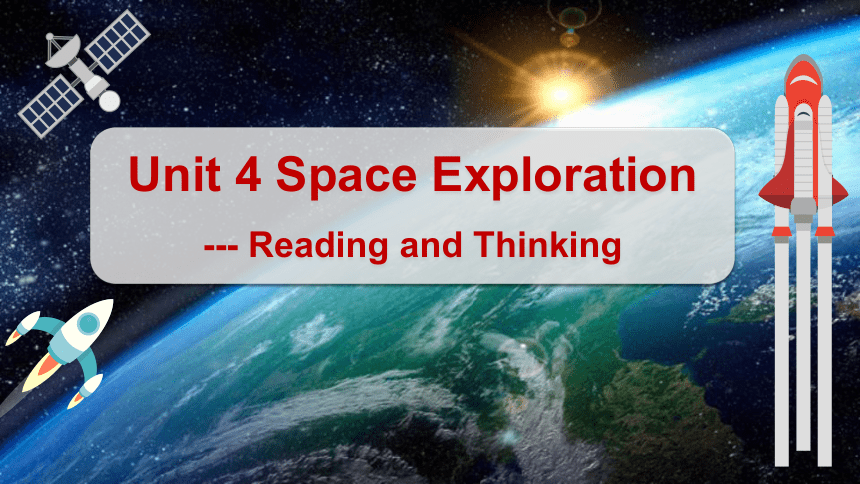
|
|
| 格式 | pptx | ||
| 文件大小 | 27.9MB | ||
| 资源类型 | 教案 | ||
| 版本资源 | 人教版(2019) | ||
| 科目 | 英语 | ||
| 更新时间 | 2024-05-21 17:37:17 | ||
图片预览

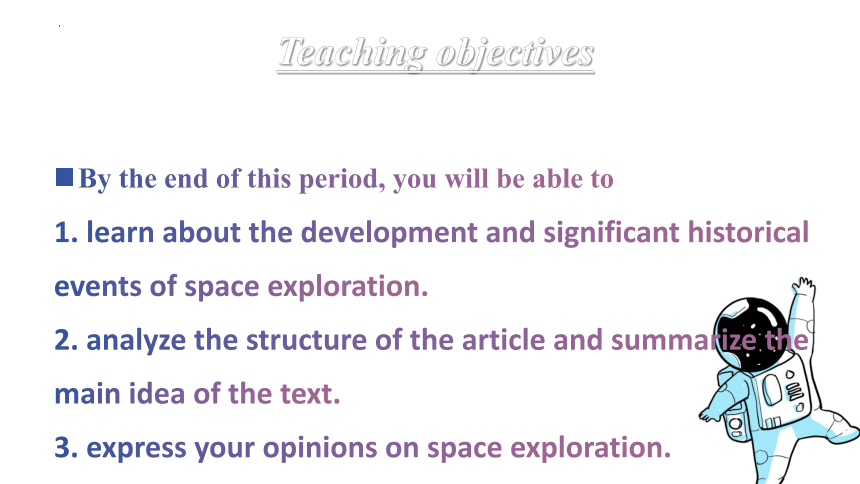
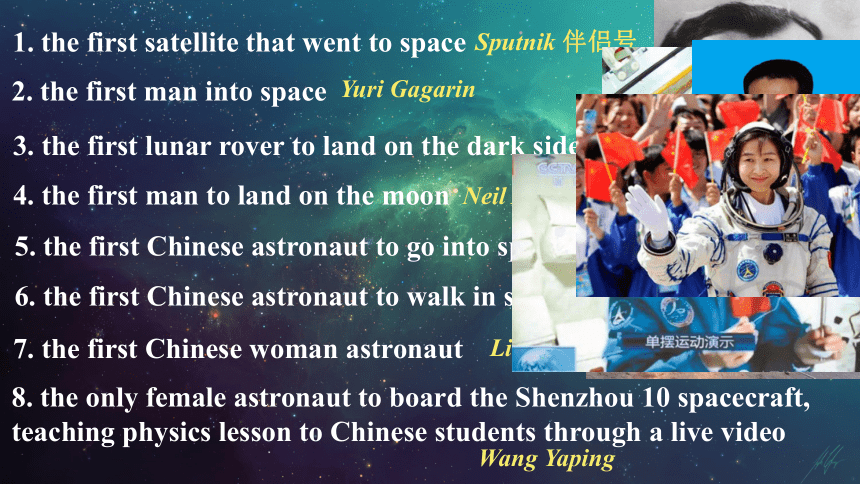
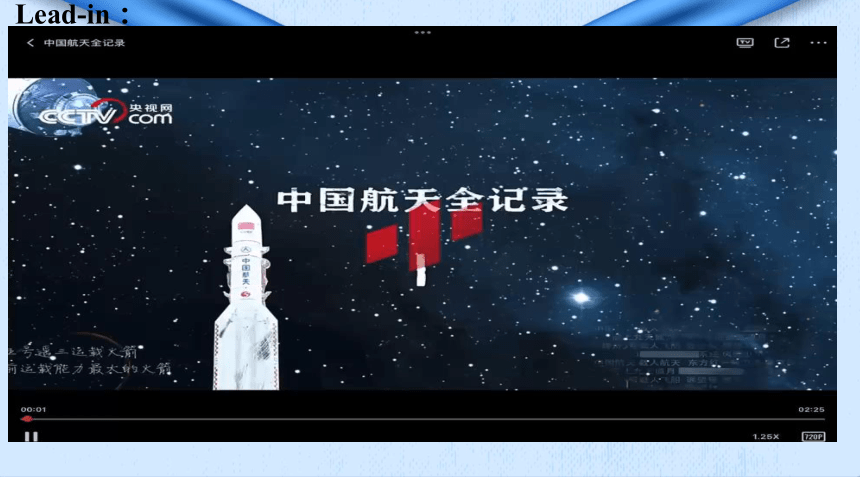
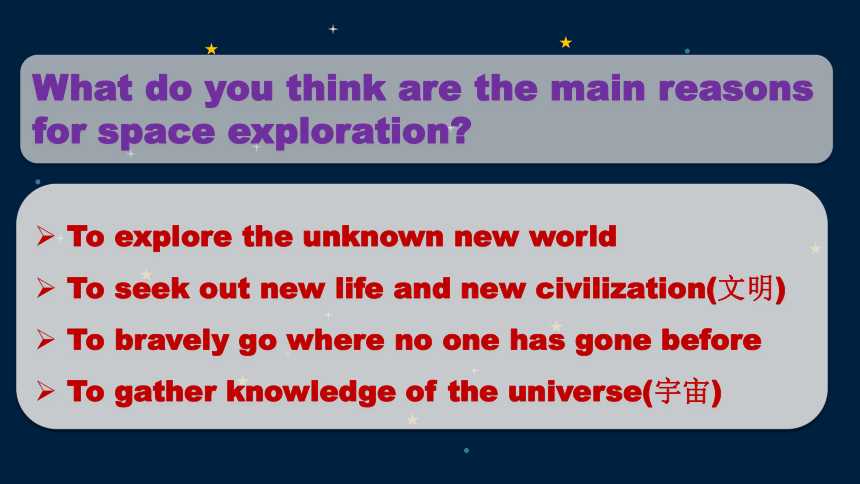
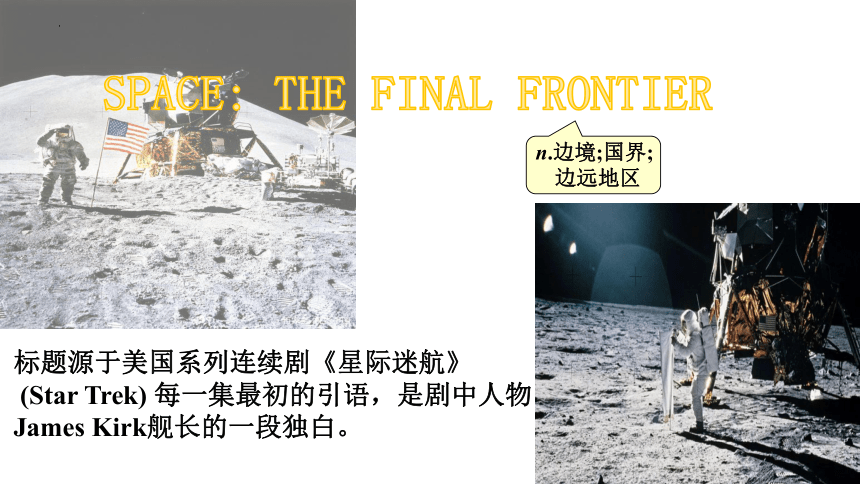
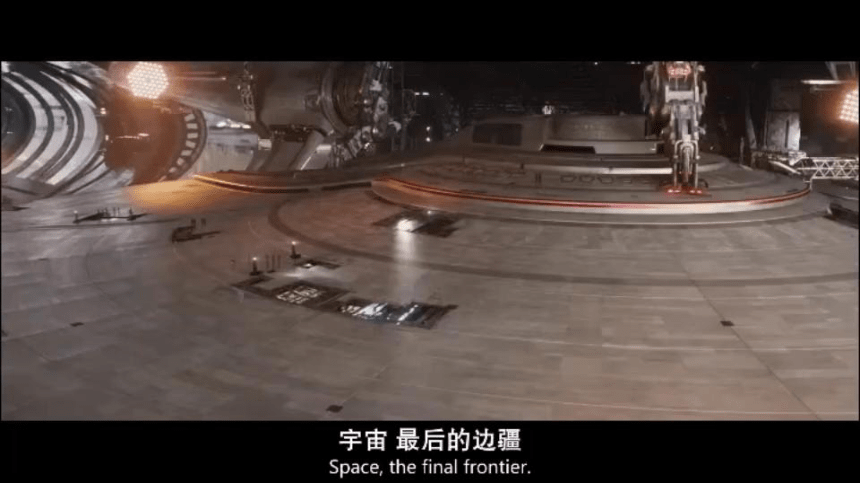
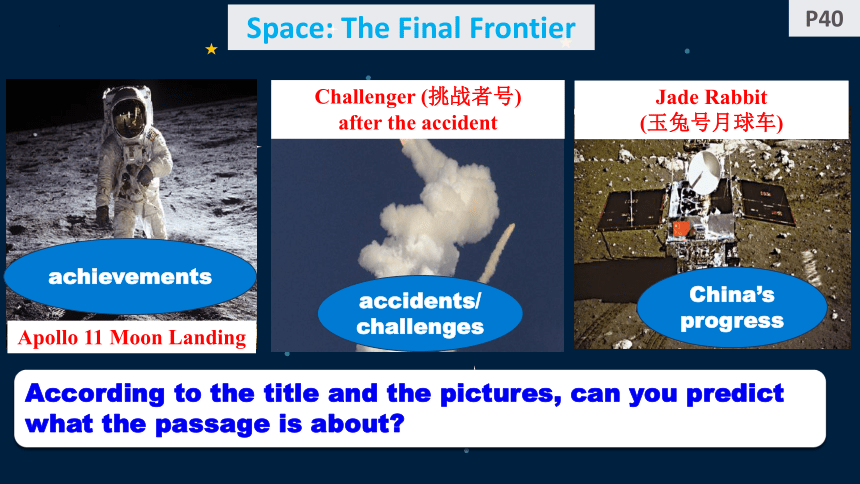
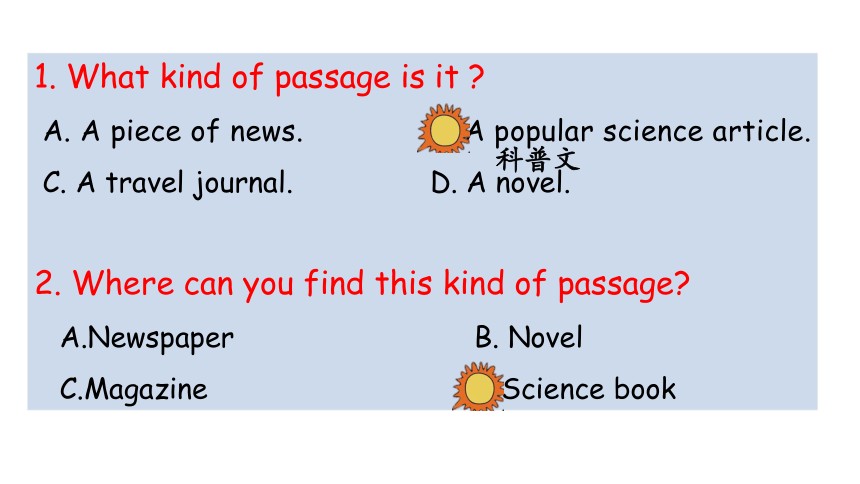
文档简介
(共28张PPT)
Unit 4 Space Exploration
--- Reading and Thinking
1. learn about the development and significant historical events of space exploration.
2. analyze the structure of the article and summarize the main idea of the text.
3. express your opinions on space exploration.
By the end of this period, you will be able to
Teaching objectives
5. the first Chinese astronaut to go into space
6. the first Chinese astronaut to walk in space
7. the first Chinese woman astronaut
8. the only female astronaut to board the Shenzhou 10 spacecraft, teaching physics lesson to Chinese students through a live video
2. the first man into space
1. the first satellite that went to space
4. the first man to land on the moon
3. the first lunar rover to land on the dark side of the moon
Sputnik 伴侣号
Yuri Gagarin
Chang’e 4
Neil Armstrong
Yang Liwei
Zhai Zhigang
Liu Yang
Wang Yaping
Lorem ipsum dolor sit amet, consectetur adipiscing elit. Integer mollis vehicula ligula ut faucibus ger mor, Cura bitur vestib ulum consequat urna et vehicula.
Lead-in:
delay
What do you think are the main reasons for space exploration
To explore the unknown new world
To seek out new life and new civilization(文明)
To bravely go where no one has gone before
To gather knowledge of the universe(宇宙)
SPACE: THE FINAL FRONTIER
n.边境;国界; 边远地区
标题源于美国系列连续剧《星际迷航》
(Star Trek) 每一集最初的引语,是剧中人物
James Kirk舰长的一段独白。
Jade Rabbit
(玉兔号月球车)
Challenger (挑战者号)
after the accident
Apollo 11 Moon Landing
delay
Space: The Final Frontier
According to the title and the pictures, can you predict what the passage is about
achievements
accidents/
challenges
China’s progress
P40
1. What kind of passage is it
A. A piece of news. B. A popular science article.
C. A travel journal. D. A novel.
2. Where can you find this kind of passage
A.Newspaper B. Novel
C.Magazine D.Science book
科普文
1. Several sentences have been removed from the text. Choose the correct sentences [A-D] to fill each gap.
A. Although scientists try to make sure nothing
goes wrong, accidents can still happen.
B. Space exploration has come a long way, and we now hope to discover other planets that are suitable enough to support life.
C. The future of space exploration remains bright.
D. After many experiments, they succeeded in
making rockets that could escape Earth's gravity.
Fast-reading
1.
2.
Ability aims
空在段首: 通常是段落主题句。根据段落一致性原则,查找同义词或相关的词,推断出主题
空在段中:
空在段尾:
通常是段落主题句。根据段落一致性原则,查找同义词或相关的词,推断出主题句,段落主题句。一致性原则,查找同义词或相关的通常是段落主题句。根据段落一致性原则,查找同义词或相关的词,推断出主题句词,推断出主题句
通常是段落主题句。根据段落一致性原则,查找同义词或相关通常是段落主题句。根据段落一致性原则,查找同义词或相关的词,推断出主题句
的词,推断出主题句
看段落主题句,分析该空与空前、空后之间的逻辑关系。注意同词复现,同范畴词复现、替代词
通常是结论、概括性语句 ,或起呈上的作用。注意在选项中查找表示结果、结论、总结的句子。
A. Although scientists try to make sure nothing goes wrong, accidents can still happen.
B. Space exploration has come a long way, and we now hope to discover other planets that are suitable enough to support life.
C. The future of space exploration remains bright.
D. After many experiments, they succeeded in making rockets that could escape Earth's gravity.
Analyze the options
What should we pay attention to
key information: subject, object...
pronouns, linking words
expressions to tell order of time, space...
(1) Para. 1 A. China's progress of space exploration.
(2)Para. 2 B. Earlier achievements of space exploration.
(3)Para. 3 C. Bright future of space exploration.
(4)Para. 4 D. The desire to explore the outer space.
(5)Para. 5 E. Continuous effort in spite of disasters.
n.成就 v.achieve
Read quickly and match the main idea with each paragraph.
A. Although scientists try to make sure nothing goes wrong, accidents can still
happen.
B. Space exploration has come a long way, and we now hope to discover other planets that are suitable enough to support life.
C. The future of space exploration remains bright.
D. After many experiments, they succeeded in making rockets that could
escape Earth’s gravity.
“Are we alone What’s out there ” People have always looked up at the stars and wondered about space. Today, scientists design vehicles to carry astronauts into space to make important discoveries. _____.
B
Para 1
Before the mid-20th century, most people felt travelling into space was only a dream that could never come true. However, some scientists were determined to realise that dream to explore space. _______. On 4 October 1957, ... and on 12 April 1961, ... Over eight years later, on 20 July 1969, ...
D. After many experiments, they succeeded in making rockets that could escape Earth’s gravity.
D
对前文的承接,对后文的概括
解释例证
Para 2
Para2
1977
timeline
Sputnik 1 satellite
Yuri Gagarin
Voyager 1
1957
1961
1969
time
events
旅伴1号
尤里.加加林
旅行者1号
尼尔.阿姆斯
特朗
Neil Armstrong
before the mid-20th century
4 Oct. 1957
12 Apr. 1961
20 Jul. 1969
5 Sep. 1977
an impossible dream
The Sputnik 1 satellite was launched bt the USSR
Yuri Gagarin, he first person to go into space
Neil Armstrong stepped onto the moon
Voyager 1 was sent to study deep space, and transmits data today
a reality
determination
persistence
curiosity
effort
ambition
That’s one small step for a man, a giant leap for mankind.
Space exploration motivates human’s determination, persistence, curiosity, effort and ambition.
Para. 2
impossible dream
before the mid-20th century
4 Oct. 1957
12 Apr. 1961
20 Jul. 1969
5 Sep. 1977
The Sputnik 1 satellite was launched bt the USSR
Yuri Gagarin, he first person to go into space
Neil Armstrong stepped onto the moon
Voyager 1 was sent to study deep space, and transmits data today
The USA
The USSR
VS
Why was space exploration mainly carried out by the USSR and the US in the 20th century
the Cold War
competition between two superpowers
Further thinking:
Space exploration is always successful and satisfying
Do humans stop exploring space due to problems or failures
Why don’t humans stop
Para 3
_____. All the astronauts on the Soyuz 11 and Challenger,and Columbia spacecrafts died during their missions. However, such disasters brought much sadness and disappointment, the desire to explore the universe did not die. This is because people believe in the importance of carrying on space exploration despite the huge risks …
A. Although scientists try to make sure nothing goes wrong, accidents can still happen.
A
关键词复现:近义词;同义词
Para 3
Underline
the time
Reading for details
delay
Para 4
In 2003
Sent Tianwen 1 to explore the surface of Mars.
On 23 July 2020
launch of the Mengtian module signaled the basic completion of the Tiangong Space Station
In 2022
China became the 3rd country to independently send humans into space.
Shenzhou 5
development
What’s the future of space exploration
Is it bright or hopeless
Para 5
Further thinking
Para 5
The future of space exploration remains bright. Many countries have plans to further study planets like Mars and Jupiter. Despite the difficulties, scientists hope to make more valuable discoveries that will enable the human race to survive well into the future.
1. What is the attitude of scientists
pessimistic B. disappointed C. puzzled D. positive
a community with a shared future for mankind人类命运共同体
Will we work alone or together to achieve the dream
Reading for main ideas
delay
Para 1:
Para 2: People’s dream of space exploration came true in the 20th century.
Para 3: Despite the huge risks, humans still desire to explore space.
Para 4: China’s space programme has made great progress in a short time.
Para 5: The future of space exploration remains bright.
People are always curious about space and scientists work hard.
The passage is about the ____________ of space exploration.
development
The future of space exploration remains ___________.
Scientists help us _________ well into the future.
Why to explore
(Para 1)
How to explore
(Para 2-4)
What to explore
(Para 5)
People always want to learn more about _______, so they send people into space:
* to ________ the secrets of the universe.
* hope to discover other planets that
are ________ enough to support life.
space
find out
suitable
Despite many ___________________,
* scientists __________ in making rockets.
* many countries have made great
_________________.
succeeded
achievements
risks /difficulties
bright
survive
Reading for structure
Space Exploration
Further thinking
2. What good qualities(品质) can we learn from
the scientists and astronauts/taikonauts
brave(bold)
responsible
determined
selfless
devoted
ambitious(有雄心的)
...
Thank you!
Unit 4 Space Exploration
--- Reading and Thinking
1. learn about the development and significant historical events of space exploration.
2. analyze the structure of the article and summarize the main idea of the text.
3. express your opinions on space exploration.
By the end of this period, you will be able to
Teaching objectives
5. the first Chinese astronaut to go into space
6. the first Chinese astronaut to walk in space
7. the first Chinese woman astronaut
8. the only female astronaut to board the Shenzhou 10 spacecraft, teaching physics lesson to Chinese students through a live video
2. the first man into space
1. the first satellite that went to space
4. the first man to land on the moon
3. the first lunar rover to land on the dark side of the moon
Sputnik 伴侣号
Yuri Gagarin
Chang’e 4
Neil Armstrong
Yang Liwei
Zhai Zhigang
Liu Yang
Wang Yaping
Lorem ipsum dolor sit amet, consectetur adipiscing elit. Integer mollis vehicula ligula ut faucibus ger mor, Cura bitur vestib ulum consequat urna et vehicula.
Lead-in:
delay
What do you think are the main reasons for space exploration
To explore the unknown new world
To seek out new life and new civilization(文明)
To bravely go where no one has gone before
To gather knowledge of the universe(宇宙)
SPACE: THE FINAL FRONTIER
n.边境;国界; 边远地区
标题源于美国系列连续剧《星际迷航》
(Star Trek) 每一集最初的引语,是剧中人物
James Kirk舰长的一段独白。
Jade Rabbit
(玉兔号月球车)
Challenger (挑战者号)
after the accident
Apollo 11 Moon Landing
delay
Space: The Final Frontier
According to the title and the pictures, can you predict what the passage is about
achievements
accidents/
challenges
China’s progress
P40
1. What kind of passage is it
A. A piece of news. B. A popular science article.
C. A travel journal. D. A novel.
2. Where can you find this kind of passage
A.Newspaper B. Novel
C.Magazine D.Science book
科普文
1. Several sentences have been removed from the text. Choose the correct sentences [A-D] to fill each gap.
A. Although scientists try to make sure nothing
goes wrong, accidents can still happen.
B. Space exploration has come a long way, and we now hope to discover other planets that are suitable enough to support life.
C. The future of space exploration remains bright.
D. After many experiments, they succeeded in
making rockets that could escape Earth's gravity.
Fast-reading
1.
2.
Ability aims
空在段首: 通常是段落主题句。根据段落一致性原则,查找同义词或相关的词,推断出主题
空在段中:
空在段尾:
通常是段落主题句。根据段落一致性原则,查找同义词或相关的词,推断出主题句,段落主题句。一致性原则,查找同义词或相关的通常是段落主题句。根据段落一致性原则,查找同义词或相关的词,推断出主题句词,推断出主题句
通常是段落主题句。根据段落一致性原则,查找同义词或相关通常是段落主题句。根据段落一致性原则,查找同义词或相关的词,推断出主题句
的词,推断出主题句
看段落主题句,分析该空与空前、空后之间的逻辑关系。注意同词复现,同范畴词复现、替代词
通常是结论、概括性语句 ,或起呈上的作用。注意在选项中查找表示结果、结论、总结的句子。
A. Although scientists try to make sure nothing goes wrong, accidents can still happen.
B. Space exploration has come a long way, and we now hope to discover other planets that are suitable enough to support life.
C. The future of space exploration remains bright.
D. After many experiments, they succeeded in making rockets that could escape Earth's gravity.
Analyze the options
What should we pay attention to
key information: subject, object...
pronouns, linking words
expressions to tell order of time, space...
(1) Para. 1 A. China's progress of space exploration.
(2)Para. 2 B. Earlier achievements of space exploration.
(3)Para. 3 C. Bright future of space exploration.
(4)Para. 4 D. The desire to explore the outer space.
(5)Para. 5 E. Continuous effort in spite of disasters.
n.成就 v.achieve
Read quickly and match the main idea with each paragraph.
A. Although scientists try to make sure nothing goes wrong, accidents can still
happen.
B. Space exploration has come a long way, and we now hope to discover other planets that are suitable enough to support life.
C. The future of space exploration remains bright.
D. After many experiments, they succeeded in making rockets that could
escape Earth’s gravity.
“Are we alone What’s out there ” People have always looked up at the stars and wondered about space. Today, scientists design vehicles to carry astronauts into space to make important discoveries. _____.
B
Para 1
Before the mid-20th century, most people felt travelling into space was only a dream that could never come true. However, some scientists were determined to realise that dream to explore space. _______. On 4 October 1957, ... and on 12 April 1961, ... Over eight years later, on 20 July 1969, ...
D. After many experiments, they succeeded in making rockets that could escape Earth’s gravity.
D
对前文的承接,对后文的概括
解释例证
Para 2
Para2
1977
timeline
Sputnik 1 satellite
Yuri Gagarin
Voyager 1
1957
1961
1969
time
events
旅伴1号
尤里.加加林
旅行者1号
尼尔.阿姆斯
特朗
Neil Armstrong
before the mid-20th century
4 Oct. 1957
12 Apr. 1961
20 Jul. 1969
5 Sep. 1977
an impossible dream
The Sputnik 1 satellite was launched bt the USSR
Yuri Gagarin, he first person to go into space
Neil Armstrong stepped onto the moon
Voyager 1 was sent to study deep space, and transmits data today
a reality
determination
persistence
curiosity
effort
ambition
That’s one small step for a man, a giant leap for mankind.
Space exploration motivates human’s determination, persistence, curiosity, effort and ambition.
Para. 2
impossible dream
before the mid-20th century
4 Oct. 1957
12 Apr. 1961
20 Jul. 1969
5 Sep. 1977
The Sputnik 1 satellite was launched bt the USSR
Yuri Gagarin, he first person to go into space
Neil Armstrong stepped onto the moon
Voyager 1 was sent to study deep space, and transmits data today
The USA
The USSR
VS
Why was space exploration mainly carried out by the USSR and the US in the 20th century
the Cold War
competition between two superpowers
Further thinking:
Space exploration is always successful and satisfying
Do humans stop exploring space due to problems or failures
Why don’t humans stop
Para 3
_____. All the astronauts on the Soyuz 11 and Challenger,and Columbia spacecrafts died during their missions. However, such disasters brought much sadness and disappointment, the desire to explore the universe did not die. This is because people believe in the importance of carrying on space exploration despite the huge risks …
A. Although scientists try to make sure nothing goes wrong, accidents can still happen.
A
关键词复现:近义词;同义词
Para 3
Underline
the time
Reading for details
delay
Para 4
In 2003
Sent Tianwen 1 to explore the surface of Mars.
On 23 July 2020
launch of the Mengtian module signaled the basic completion of the Tiangong Space Station
In 2022
China became the 3rd country to independently send humans into space.
Shenzhou 5
development
What’s the future of space exploration
Is it bright or hopeless
Para 5
Further thinking
Para 5
The future of space exploration remains bright. Many countries have plans to further study planets like Mars and Jupiter. Despite the difficulties, scientists hope to make more valuable discoveries that will enable the human race to survive well into the future.
1. What is the attitude of scientists
pessimistic B. disappointed C. puzzled D. positive
a community with a shared future for mankind人类命运共同体
Will we work alone or together to achieve the dream
Reading for main ideas
delay
Para 1:
Para 2: People’s dream of space exploration came true in the 20th century.
Para 3: Despite the huge risks, humans still desire to explore space.
Para 4: China’s space programme has made great progress in a short time.
Para 5: The future of space exploration remains bright.
People are always curious about space and scientists work hard.
The passage is about the ____________ of space exploration.
development
The future of space exploration remains ___________.
Scientists help us _________ well into the future.
Why to explore
(Para 1)
How to explore
(Para 2-4)
What to explore
(Para 5)
People always want to learn more about _______, so they send people into space:
* to ________ the secrets of the universe.
* hope to discover other planets that
are ________ enough to support life.
space
find out
suitable
Despite many ___________________,
* scientists __________ in making rockets.
* many countries have made great
_________________.
succeeded
achievements
risks /difficulties
bright
survive
Reading for structure
Space Exploration
Further thinking
2. What good qualities(品质) can we learn from
the scientists and astronauts/taikonauts
brave(bold)
responsible
determined
selfless
devoted
ambitious(有雄心的)
...
Thank you!
